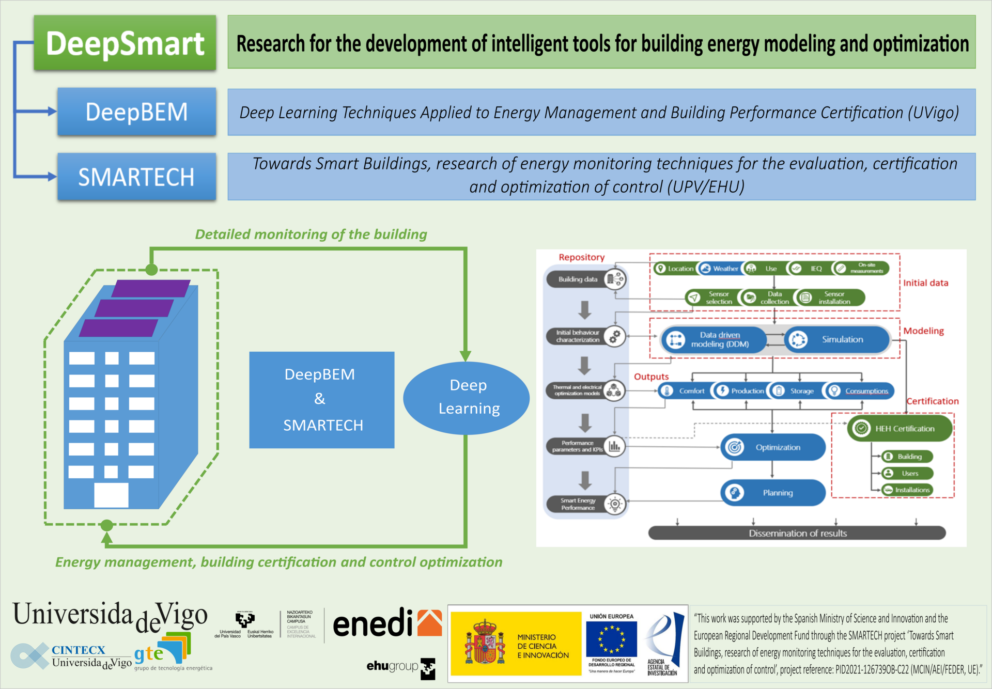The DeepSmart Project began in September 2022 and will run until September 2025. The DeepSmart project is a coordinated project between the University of Vigo (UVigo) and the University of the Basque Country (UPV/EHU). Each university is the leader of following sub-projects:
- DeepBEM: Deep Learning Techniques Applied to Energy Management and Building Performance Certification (UVigo)
- SMARTECH: Towards Smart Buildings, research of energy monitoring techniques for the evaluation, certification and optimization of control (UPV/EHU)
Previously, within the SMARTHERM Project (2019-2021), precise thermal models of buildings were obtained, which allowed the in-use energy certification of buildings and predict the possible savings that renovations could produce. Now, with the DeepSmart Project, it is intended to go further in the line of Smart buildings, modeling the operation and production, storage and consumption of electrical energy. From the monitored data of the building and the people who occupy it and using Machine Learning models, it is intended to achieve the following objectives:
- Develop replicable characterization and quality assurance methodologies integrated into a statistical and construction framework to characterize and evaluate the real energy performance of buildings based on monitored data.
- Disaggregate energy efficiency according to the three main sources: building envelope, systems and users.
- Correctly model the production, storage, consumption and grid injection of photovoltaic electricity.
- Use the models for optimizing the energy consumption of a building based on monitoring data.
In the first part, the project aims to generate real data, at the level of the building in use, for the development of the models. For this, the two buildings that the ENEDI group has been monitoring in previous projects will be used, consisting of a tertiary building, which corresponds to the Vice-Rector of the University of the Basque Country, and a residential building, located in the old town of Vitoria. These two buildings have such an extremely detailed monitoring system that it will allow to discriminate the effects of the building envelope, the facilities and the user on energy consumption. On the other hand, the Machine Learning models to be developed by the GTE group must work with a minimum number of monitoring data that can be collected automatically, for their final application, so that they must be fed with the most reliable and representative data of this final scenario. For this, ENEDI will be in charge of treating and adapting the available data of a wide group of real houses monitored by the Basque Government through its social housing service and aid for rehabilitation.
In the second part of the project, the developed control approaches will be tested in a practical way. For this, the heat pump of the residential building will be used. This heat pump is powered only from the electrical network. The control of this heat pump will seek to minimize energy costs during a whole year of operation trying to keep the interior environment of the building within the upper and lower temperature limits established by RITE. Deep Learning models generated by GTE will have availability for energy monitoring data (including monitoring data from the previous year to know the energy behavior of the house), the weather forecast for the next 24 hours and electricity prices for the next 24 hours to minimize energy costs while maintaining interior comfort. This study will allow evaluating the potential of the thermal inertia of buildings as an efficient short-term energy storage system that would complement the storage of electrical energy using batteries.

